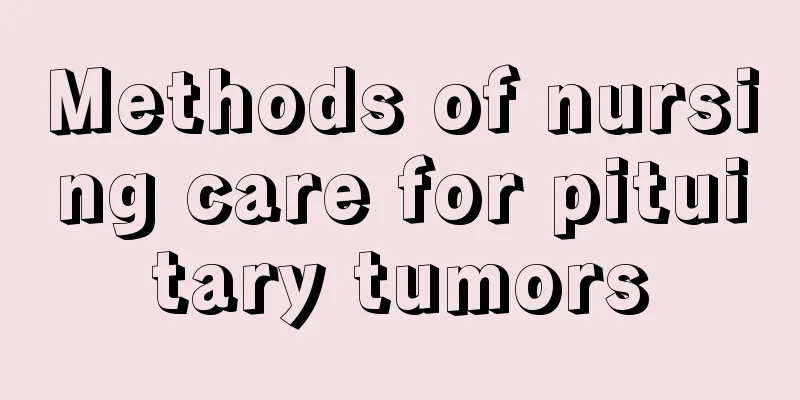Methods of nursing care for pituitary tumors

|
Postoperative care for pituitary tumors is also an important part of the surgery. This requires medical staff and family members to pay close attention to the patient's condition. If pituitary tumor diseases can receive proper care, the patient's chance of recovery will be greatly improved. So, what are the methods of pituitary tumor disease care? Let's listen to the experts' introduction. The first thing to know is that pituitary tumors are a group of tumors that originate from the anterior and posterior pituitary and residual cells of the craniopharyngeal epithelium. 90% are benign adenomas, a few are hyperplasia, and very few are cancer. The cause and pathogenesis are not very clear at present. Its main clinical manifestations include two syndromes: abnormal hormone secretion syndrome; syndrome of tumor compression of the surrounding pituitary tissue. In addition to symptomatic and supportive treatment, the treatment options include radiation, surgery, and medication. Common nursing issues include: ① self-image disturbance; ② changes in comfort; ③ changes in perception: vision; ④ potential complications-pituitarism crisis. 1. Disrupted Self-Image Related factors A functioning pituitary tumor produces too much hormone. 【Main manifestations】 Gigantism, acromegaly, Cushing's disease with heavy melanin, dwarfism, etc. 【Nursing Goals】 1. Be able to correctly recognize existing changes in physical appearance. 2. Able to use appropriate coping mechanisms. 【Nursing measures】 1. Talk to the patient, encourage him/her to express his/her feelings, and provide positive guidance. 2 Encourage patients to maintain the habit of regular grooming and methods to improve their personal image: appropriate clothing and appropriate grooming. 3. Encourage patients to strengthen their self-cultivation, improve their inner qualities, and dare to face reality. 4. Help patients adapt to daily life, participate in social activities and interpersonal communication. 【Key evaluation】 Whether the patient can resume normal social activities and interpersonal interactions. 2. Comfort Changes: Headaches Related factors The tumor presses on the tissues surrounding the pituitary gland. 【Main manifestations】 Persistent headache, located in the forehead, bilateral temporal sides, retroorbital areas, etc., may also present as bloating and pain with paroxysmal aggravation. 【Nursing Goals】 1 The patient's headache was relieved. 2. Be able to use effective methods to relieve pain. 【Nursing measures】 1. Ask the patient to rest in bed, keep the indoor environment quiet and the room temperature appropriate, reduce the stimulation of adverse factors as much as possible, and facilitate the patient to sleep and relax. 2. Assist patients to meet their daily needs. 3. Guide patients to use pain relief techniques: ① imagination; ② distraction techniques; ③ relaxation techniques. 4. Report to your doctor immediately if your headache worsens. 【Key evaluation】 1. The degree of headache relief. 2. Does the patient have any accompanying symptoms when having headache? 3. Changes in Perception: Vision Related factors The tumor compresses the optic nerve, chiasm, and optic tract. 【Main manifestations】 Decreased vision, visual field loss, and fundus changes. 【Nursing Goals】 1. No trauma occurred to the patient. 2 Able to take care of oneself in daily life. 【Nursing measures】 1. Introduce the ward environment to the patient in detail and provide appropriate light source. 2. Place commonly used items such as water, tableware, and pagers within the patient's field of vision. 3. Remove obstacles in the environment and keep items in the room relatively fixed. Inform the patient if the position of items is changed. 4 Avoid leaving the door half open, make sure it is fully open or fully closed. 5. Keep the bed at a low level and have handrails beside the bed. 6. Assist the patient when walking, provide appropriate assistive devices and practice their use. 【Key evaluation】 1. The degree of visual recovery of the patient. 2. Abilities possessed by persons with visual impairment. Four potential complications--pituitarism crisis 【Related factors】 1. Pituitary tumor compresses the normal pituitary gland, causing hypopituitarism. 2. Stressful conditions such as infection, vomiting, diarrhea, surgery, hunger, cold, trauma, and the use of various sedatives and sleeping pills. 【Main manifestations】 Mental disorder, delirium, high fever, low temperature, nausea, vomiting, hypoglycemia, syncope, coma, etc. 【Nursing Goals】 The patient did not experience pituitary crisis. 【Nursing measures】 1. Provide a high-calorie, high-protein, and high-vitamin diet. 2. Guide patients to establish a good life system and maintain physical and mental health. 3. Advise patients to pay attention to personal hygiene and prevent infection. 4. Advise the patient to avoid cold, excessive fatigue and excitement. 【Key evaluation】 Whether the patient has symptoms and signs of pituitary crisis. Through this article, I believe the nursing care for patients with pituitary tumors has been introduced very clearly. At this time, family members need to support patients spiritually so that they can feel at ease during treatment and recover soon. |
<<: How to best treat a pituitary tumor
>>: Conventional treatment and adjuvant treatment of testicular cancer
Recommend
Can water chestnuts be eaten with the skin?
Water chestnut is also called water caltrop. It i...
Fresh Bamboo Sap Oral Liquid
Fresh bamboo sap oral liquid is a good choice for...
Is male breast cancer more dangerous? 3 dangers of male breast cancer
Breast cancer is the most common malignant tumor ...
Remember these 6 words to stay away from fake and inferior food
People are increasingly concerned about food safe...
What are the symptoms of vitamin E deficiency
If you often like to eat meat but not vegetables ...
Teach you how to identify melanoma
Melanoma is a less common disease. The movie &quo...
What is sinus arrhythmia? You need to know these
Sinus arrhythmia is a type of cardiac arrhythmia....
Early treatment of ovarian teratoma
Ovarian teratoma is a common ovarian germ cell tu...
How to care for cerebral infarction
We usually call cerebral infarction cerebral infa...
Is there alum in fried dough sticks?
Nowadays, if people don’t want to make breakfast ...
Is it normal to have sex three times a day?
Sexual intercourse is a common intimate behavior ...
What are the treatments for vasculitis
Vasculitis is the abbreviation of thromboangiitis...
What causes dry skin to become oily
Dry skin is more prone to cracking in the winter,...
Repeatedly picking at scalp scabs
Human skin is very fragile. It may bleed if touch...
What to do if the gonad reflex area hurts
Headache in the gonad reflex area is a symptom th...









